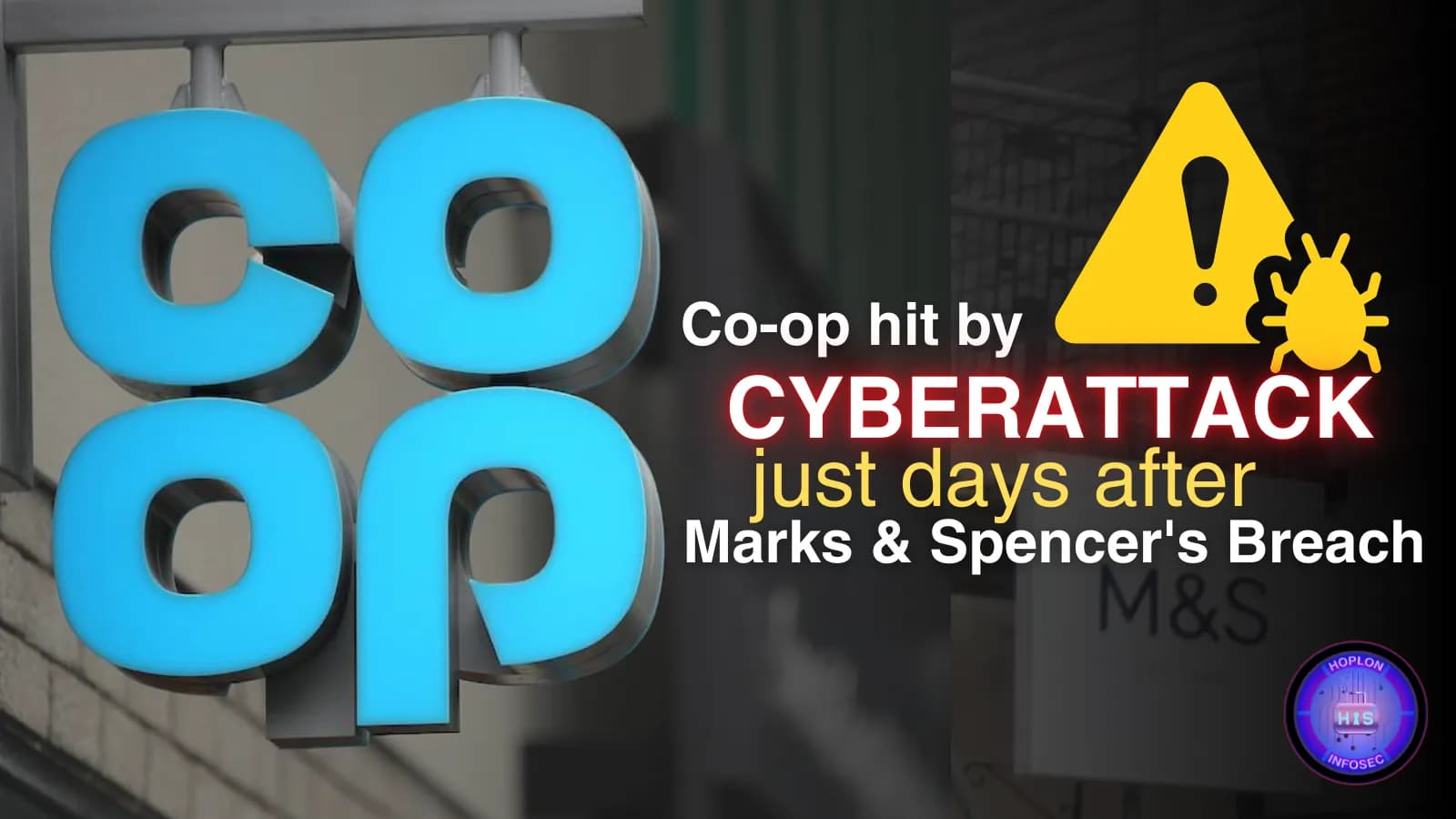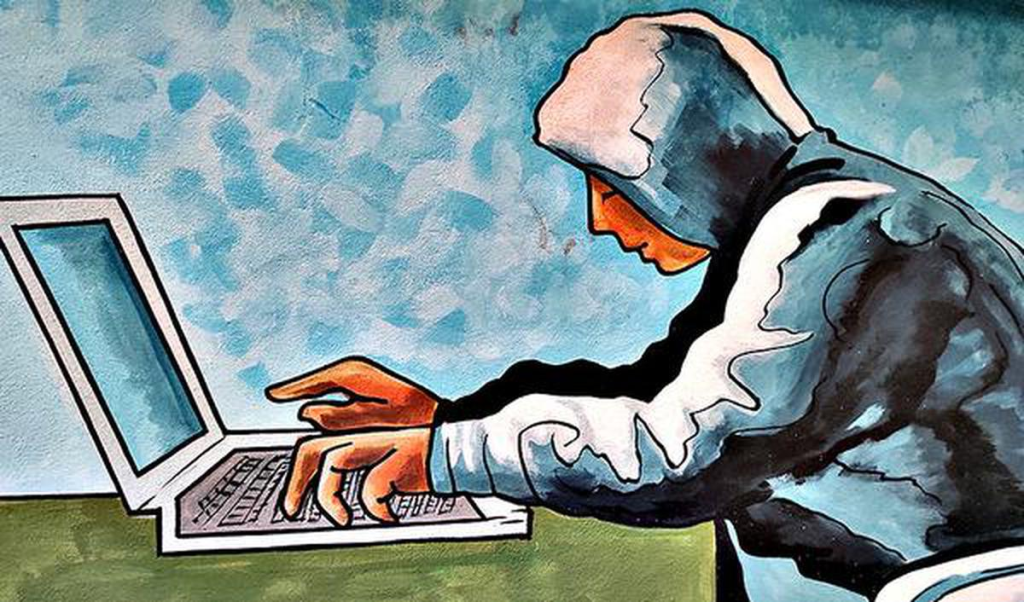Co-op Shuts Down IT Systems After Hack Attempt: What You Need to Know

Hoplon InfoSec
01 May, 2025
In a startling move, Co-op has been forced to shut down parts of its IT system after a cyberattack attempt—just days after Marks & Spencer faced a similar serious breach. This incident is a stark reminder of the cybersecurity threats that continue to grow, affecting companies of all sizes across industries. The timing makes this even more significant—these attacks seem to be part of a larger pattern that is becoming more common across the retail sector.
What Happened at Co-op?

The Co-op Group, which owns more than 2,000 grocery stores and 800 funeral parlors and offers various legal and financial services, was targeted by hackers. As soon as the cyberattack was discovered, the company decided to take swift and decisive action to mitigate the risk.
According to an internal letter seen by the Guardian, Co-op confirmed that it had preemptively shut down specific systems to secure its infrastructure. The affected services included parts of its back office, call centers, and stock monitoring systems. The decision to halt some operations was necessary to ensure the safety of its networks, but it did lead to some disruptions.
One immediate consequence of the attack was the shutdown of the stock monitoring system, leading to empty shelves in some stores. Additionally, employees were temporarily unable to work remotely as access to specific systems was blocked. Despite these issues, Co-op assured customers that its grocery stores and funeral homes were still operational, and home deliveries continued without delay.
The Co-op’s quick action demonstrates the importance of proactive cybersecurity measures and highlights companies’ vulnerabilities in today’s digital landscape.
Why It Matters
1. Retailers Are Prime Targets

Cybercriminals target retailers for several reasons, and Co-op’s incident is a perfect example. Hackers want corporate data and customer information. With millions of transactions occurring every day, retailers hold vast amounts of sensitive personal data, making them a prime target.
The fact that Co-op’s attack occurred just days after Marks & Spencer suffered a significant breach signals a worrying trend. Both incidents suggest that hackers increasingly target major brands to gain unauthorized access to customer data, financial information, and supply chain systems.
Hackers often seek more than corporate secrets; they aim to disrupt operations and access sensitive customer data. Given the massive impact this can have on customers’ trust, retailers and other companies must stay ahead of the game regarding cybersecurity.
2. The Impact of Cyber Incidents

A cyberattack, even one quickly contained, can have long-term consequences. Aside from immediate disruptions—such as empty shelves, broken systems, or service delays—companies also face the potential loss of customer trust. Customers may seek alternative options if their data is no longer safe. The reputation damage can be severe and may take months or even years to recover.
In the case of Co-op, the shutdown of critical business services like stock monitoring and remote work systems may have inconvenienced employees and customers alike. If the attack isn’t addressed promptly, these disruptions can quickly escalate.
Furthermore, the financial costs of a cyberattack are not confined to the immediate response. Legal fees, potential penalties, and the cost of restoring systems can add up quickly. According to studies, the average cost of a data breach to a company can range from hundreds of thousands to millions of dollars—and that’s before accounting for lost business and reputational damage.
3. Cyberattacks Are Becoming More Sophisticated
The sophistication of today’s cyberattacks means they are no longer isolated incidents. Hackers are becoming more organized, with groups like Scattered Spider and REvil using advanced techniques to infiltrate corporate systems. The Co-op hack is the latest example of attackers getting more skilled at evading detection and causing maximum disruption.
Experts like Marijus Briedis, CTO at NordVPN, point out that these attacks are not isolated events. The timing of these incidents—Co-op and Marks & Spencer were hit in the same week—shows a larger strategy. Attackers are not only trying to access sensitive business data but also disrupting supply chains and financial operations. This could lead to much wider consequences than just a stolen customer record.
How You Can Protect Your Business from Cyberattacks

Co-op’s response to this cyberattack offers valuable insights into how businesses can mitigate risks and prepare for the worst. Let’s take a look at some proactive measures that can help protect your company from similar attacks:
1. 24/7 Threat Monitoring
The first line of defense is the ability to detect suspicious activity before it becomes a serious problem. Hackers are constantly probing systems for vulnerabilities, and catching them early is key. With real-time threat monitoring, your business can detect and respond to threats quickly, reducing the potential damage.
2. Regular Vulnerability Assessments
Unpatched vulnerabilities in systems or applications are a significant cause of cyberattacks. Regularly assessing your company’s security posture and patching any gaps is critical. Co-op’s attack likely exploited such a vulnerability. By running security audits and conducting regular vulnerability assessments, businesses can identify and fix these weaknesses before hackers exploit them.
3. Employee Cybersecurity Training
In many cases, cyberattacks are successful because of human error. Phishing attacks and social engineering techniques can trick even the most careful employees into giving away access credentials or clicking on malicious links. Employee training is one of the most cost-effective ways to protect your company from cyber threats. Employees should be well-versed in cybersecurity best practices, such as identifying phishing emails, using strong passwords, and understanding the importance of multi-factor authentication.
4. Backup and Disaster Recovery Plans
Data loss during a cyberattack can be devastating. That’s why businesses must have a backup strategy in place. By regularly backing up critical systems and data, you can ensure that your business can recover quickly in the event of an attack. Additionally, companies should have a disaster recovery plan that outlines the steps to take when systems are compromised, helping to ensure a smooth recovery.
Cybersecurity for Retailers and Beyond
Co-op’s recent incident highlights the increasing importance of cybersecurity in today’s digital age. While businesses in the retail sector are particularly vulnerable, cybersecurity threats affect every industry. Retailers, banks, manufacturers, and even small companies are all at risk of cyberattacks.
Both Co-op and Marks & Spencer are currently working with the National Cyber Security Centre (NCSC) to investigate the attacks and determine if there are any links between the two incidents. This collaboration between government agencies and private companies is crucial for understanding how these attacks work and how they can be prevented in the future.
As cybercrime evolves, companies must prioritize cybersecurity as a core aspect of their business strategy. The good news is that by taking proactive steps to protect systems, train employees, and monitor for threats, businesses can minimize their risk and improve their ability to recover from attacks when they do occur.
Be Prepared, Stay Secure
Co-op’s cyberattack serves as a wake-up call for businesses of all sizes. The company’s quick action to shut down parts of its IT systems is commendable, but this situation could have been avoided with stronger security measures and more comprehensive employee training.
Key Takeaways:
Stay vigilant: Keep a close eye on your systems and constantly monitor for suspicious activity.
Train your staff: Cybersecurity isn’t just an IT issue—it’s a company-wide responsibility.
Have a plan: Make sure you have a disaster recovery plan in place and that your team is well-prepared to act if an attack occurs.
Share this :